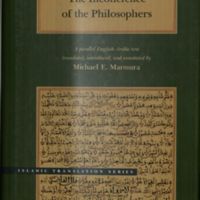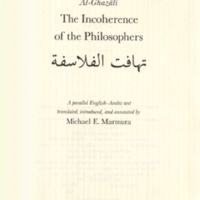The Incoherence of the Philosophers : Tahāfut al-falāsifah: a parallel English-Arabic text
Dublin Core
Title
The Incoherence of the Philosophers : Tahāfut al-falāsifah: a parallel English-Arabic text
Subject
Philosophy, Arab -- Early works to 1800
Islam and philosophy -- Early works to 1800
Methodology -- Early works to 1800
Faith and reason -- Islam -- Early works to 1800
Islam -- Doctrines
Islam and philosophy -- Early works to 1800
Methodology -- Early works to 1800
Faith and reason -- Islam -- Early works to 1800
Islam -- Doctrines
Description
"The Incoherence of the Philosophers ranks among the most important works of one of the most fascinating thinkers in the history of Islam." "Born in the eastern Iranian city of Tus in 450 A.H. (1058 C.E.), Abu Hamid Muhammad al-Ghazali also died there, relatively young, in 505 A.H. (1111 C.E.). Between those two dates, however, he established himself as a pivotal figure throughout the Islamic world." "The Incoherence of the Philosophers - itself pitched at a very sophisticated philosophical level - contends that, although Muslim philosophers such as al-Farabi and Ibn Sina (Avicenna) boasted of absolutely unassailable arguments on crucial matters of theology and metaphysics, they could not, in fact, deliver on their claims. Additionally, maintained al-Ghazali, some of their assertions represented mere disguised heresy and unbelief. The great twelfth-century Andalusian philosopher and Aristotle commentator Ibn Rushd (Averroes) attempted to refute al-Ghazali's critique in his own book The Incoherence of the Incoherence, but it remains widely read and influential today."--Jacket.
Creator
al-Ghazali
Publisher
Provo, Utah : Brigham Young University Press
Date
2000
Contributor
translated, introduced, and annotated by Michael E. Marmura
Relation
Series: Islamic translation series
Text Item Type Metadata
Original Format
Book
Citation
al-Ghazali, “The Incoherence of the Philosophers : Tahāfut al-falāsifah: a parallel English-Arabic text,” Humanities Hub, accessed February 13, 2026, https://humanitieshub.sdsu.edu/omeka/items/show/1014.


